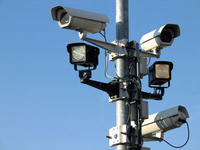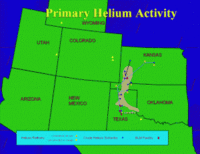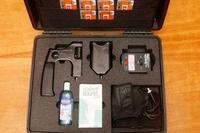-
U.S.: China orchestrating broad cyberattack campaign against U.S.

The Obama administration accused China’s military of orchestrating a campaign of cyberattacks against American government computer systems and defense contractors for the purpose of identifying “military capabilities that could be exploited during a crisis.” Cyber experts estimate that about 90 percent of all cyberattacks in the United States originate in China, but these estimates have typically been offered by private-sector experts. The Pentagon’s annual report to Congress, released Monday, is the first government document specifically and explicitly to assert that the People’s Liberation Army (PLA) is behind a sustained, systematic campaign of cyberattacks on the United States in an effort to gain a strategic advantage over the United States. The report also pointedly notes that Chinese investments in U.S. companies aim to help this cyberattacks campaign.
-
-
GOP opponents of the immigration bill gearing up for a campaign to kill it
Republicans opposed to the bi-partisan Senate immigration bill are getting set to launch a campaign to defeat the bill, as the Senate Judiciary Committee begins a review on the bill Thursday. The committee is expected to spend at least three weeks on the bill, with GOP lawmakers opposing the bill ready to offer hundreds of amendments — some in an effort to make the bill more acceptable to them, others in an effort to kill it.
-
-
Privacy, cost concerns check drive for more surveillance cameras

Law enforcement agencies in cities across the United States are campaigning to increase surveillance on city streets, impressed with the effectiveness of video surveillance in helping the Boston Police identify the two suspects in the Boston Marathon bombings. This campaign to expand law enforcement’s surveillance power is likely to run into stiff opposition, as Americans have proven suspicious of allowing the government powers which would infringe on privacy. Expanding surveillance networks also costs money, and these are tight budgetary times.
-
-
FAA oversight of jetliner repair stations is ineffective

The FAA oversees 4,800 jetliner repair stations worldwide – in countries such as China, New Zealand, Peru, and Singapore – where American commercial airplanes are being repaired. The Federal Aviation Administration’s own watchdog organization reported that the oversight of U.S. jetliner repair stations is ineffective and does not focus on stations which are most likely to present security risks.
-
-
The cost for universal access to energy
Universal access to modern energy could be achieved with an investment of between $65 and $86 billion a year up until 2030, new research has shown. The proposed investments are higher than previous estimates but equate to just 3-4 percent of current investments in the global energy system.
-
-
Governments, businesses should be “cyber-risk intelligent”
Cyber-threats must require governments and businesses to be “cyber-risk intelligent.” Three general flows of information determine an organizational frame for cyber-risk intelligence: one that encompasses the awareness of the IT enterprise and its apparent health; a second that brings internal business activities into view; and a third that encompasses broader geopolitical and economic forces.
-
-
Ash from olive residue biomass leads to more effective, cheaper concrete
Researchers have produced self-compacting concrete with ash from boiler combustion of olive pruning residue pellets. The plasticity and cohesion of this type of concrete mean no compaction is needed when used in construction and, moreover, it has other advantages with respect to conventional concrete.
-
-
Central Washington State proposed for a UAV research and testing site
The FAA Modernization and Reform Act of 2012 enacted by Congress calls for establishing six unmanned aircraft system research and testing sites in the United States. A consortium of Washington State-based organizations will soon submit the final section of a proposal to site an unmanned aircraft system research and testing facility in central Washington. If successful, the proposal to the Federal Aviation Administration (FAA) will result in the FAA naming the Pacific Northwest Unmanned Aerial Systems Flight Center as one of six U.S. testing facilities later this year.
-
-
Software to help plan the smart grid
Researchers have developed a new software tool called the Energy Zones (EZ) Mapping Tool that will help the thirty-nine states which make up the Eastern Interconnection States’ Planning Council, or EISPC identify geographic areas suitable for the development of clean energy resources, which are renewables, natural gas, coal carbon sequestration, and nuclear. Certain forms of energy storage are also included.
-
-
Horse meat in the human diet
Horse long has been on menus in continental Europe, sold from shops that often advertise with a carved horse head on the store front.A chemist explains the testing for horse DNA in food products, and discusses the concerns about selling and eating horse meat in the United States.
-
-
U.S. tech companies actively lobbying for immigration reform
Last year, only 14 percent of immigrants (around 144,000 people) were granted a green card owing to their skills and contribution to the U.S. economy. The rest of the green cards were given mostly based on family ties of the applicants to U.S. citizens. Under the Senate immigration proposal, 50 percent of future green cars would be based on skills and employment opportunities. Leading U.S. tech companies are actively campaigning in support of the proposal.
-
-
DHS chemical plant security program hobbled by problems, poor oversight
A DHS program responsible for the security of chemical facilities, such as the West Fertilizer Company plant in Texas, has been ineffective owing to a number of issues, leading federal investigators to wonder “whether it can achieve its mission, given the challenges the program continues to face.”
-
-
U.S. policy may lead to growing global shortage of helium

Helium is an essential resource in technologies such as medical imaging, rocket engines, and surveillance devices. In response to the element’s scarcity, the United States has been stockpiling helium since the 1960s in a National Helium Reserve called the Bush Dome, a deep underground reservoir outside of Amarillo, Texas. In 1996 the Helium Privatization Act mandated that the Department of the Interior sell off all the stockpiled helium by 2015. Scientists say that this action discourages the active exploration of helium since companies can buy it from the United States at a cheap price and sell it at a premium. The result will be a growing shortage of helium.
-
-
Kenya police: (fake) bomb detectors work, making Kenyans safer

A British businessman was convicted of selling Iraq and Afghanistan fake bomb detectors – the two countries used millions of dollars in U.S. aid money to purchase the sham devices (the devices were, in fact, $20 golf ball finders which the businessman sold for $40,000 each). The police in Kenya purchased twenty-six of the sham detectors, but Nairobi police chief says the devices work, and that Kenya is safer for them.
-
-
Critics say E-Verify system still has too many problems

Lawmakers and attorneys in Minnesota believe that the E-Verify system, a government database for employers to verify that their new hires are eligible to work in the United States, may not be ready just yet.. Lawmakers have raised concerns about a clause in the Senate immigration legislation which would make the E-Verify system mandatory for all businesses within five years.
-
More headlines
The long view
Factories First: Winning the Drone War Before It Starts
Wars are won by factories before they are won on the battlefield,Martin C. Feldmann writes, noting that the United States lacks the manufacturing depth for the coming drone age. Rectifying this situation “will take far more than procurement tweaks,” Feldmann writes. “It demands a national-level, wartime-scale industrial mobilization.”
Trump Is Fast-Tracking New Coal Mines — Even When They Don’t Make Economic Sense
In Appalachian Tennessee, mines shut down and couldn’t pay their debts. Now a new one is opening under the guise of an “energy emergency.”
Smaller Nuclear Reactors Spark Renewed Interest in a Once-Shunned Energy Source
In the past two years, half the states have taken action to promote nuclear power, from creating nuclear task forces to integrating nuclear into long-term energy plans.
